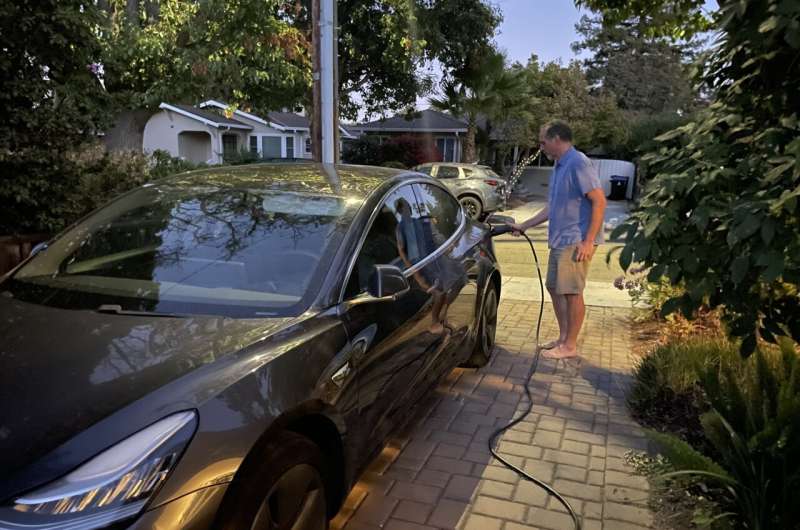
Posted on 09/22/2022 12:07:38 PM PDT by Red Badger

If the common charging of electric vehicles at home in the evening or overnight shifts to daytime at work as more cars go electric, then that would restrain extra costs for electricity systems, according to a new Stanford University study. Credit: Amy Adams/Stanford University
The vast majority of electric vehicle owners charge their cars at home in the evening or overnight. We're doing it wrong, according to a new Stanford study.
In March, the research team published a paper on a model they created for charging demand that can be applied to an array of populations and other factors. In the new study, published Sept. 22 in Nature Energy, they applied their model to the whole of the western United States and examined the stress the region's electric grid will come under by 2035 from growing EV ownership. In a little over a decade, they found, rapid EV growth alone could increase peak electricity demand by up to 25 percent, assuming a continued dominance of residential, nighttime charging.
To limit the high costs of all that new capacity for generating and storing electricity, the researchers say, drivers should move to daytime charging at work or public charging stations, which would also reduce greenhouse gas emissions. This finding has policy and investment implications for the region and its utilities, especially since California moved in late August to ban sales of gasoline powered cars and light trucks starting in 2035.
"We encourage policymakers to consider utility rates that encourage day charging and incentivize investment in charging infrastructure to shift drivers from home to work for charging," said the study's co-senior author, Ram Rajagopal, an associate professor of civil and environmental engineering at Stanford.
In February, cumulative sales of EVs in California reached 1 million, accounting for about six percent of cars and light trucks. The state has targeted 5 million EVs on the road by 2030. When the penetration hits 30 percent to 40 percent of cars on the road, the grid will experience significant stress without major investments and changes in charging habits, said Rajagopal. Building that infrastructure requires significant lead time and cannot be done overnight.
"We considered the entire western U.S. region, because California depends heavily on electricity imports from the other western states. EV charging plus all other electricity uses have consequences for the whole western region given the interconnected nature of our electric grid," said Siobhan Powell, lead author of the March study and the new one.
"We were able to show that with less home charging and more daytime charging, the Western U.S. would need less generating capacity and storage, and it would not waste as much solar and wind power," said Powell, mechanical engineering Ph.D. '22.
"And, it's not just California and western states. All states may need to rethink electricity pricing structures as their EV charging needs increase and their grid changes," added Powell, who recently took a postdoctoral research position at ETH Zurich.
Once 50 percent of cars on the road are powered by electricity in the western U.S.—of which about half the population lives in California—more than 5.4 gigawatts of energy storage would be needed if charging habits follow their current course. That's the capacity equivalent of 5 large nuclear power reactors. A big shift to charging at work instead of home would reduce the storage needed for EVs to 4.2 gigawatts.
Changing incentives
Current time-of-use rates encourage consumers to switch electricity use to nighttime whenever possible, like running the dishwasher and charging EVs. This rate structure reflects the time before significant solar and wind power supplies, when demand threatened to exceed supply during the day, especially late afternoons in the summer.
Today, California has excess electricity during late mornings and early afternoons, thanks mainly to its solar capacity. If most EVs were to charge during these times, then the cheap power would be used instead of wasted. Alternatively, if most EVs continue to charge at night, then the state will need to build more generators—likely powered by natural gas—or expensive energy storage on a large scale. Electricity going first to a huge battery and then to an EV battery loses power from the extra stop.
At the local level, if a third of homes in a neighborhood have EVs and most of the owners continue to set charging to start at 11 p.m. or whenever electricity rates drop, the local grid could become unstable.
"The findings from this paper have two profound implications: the first is that the price signals are not aligned with what would be best for the grid—and for ratepayers. The second is that it calls for considering investments in a charging infrastructure for where people work," said Ines Azevedo, the new paper's other co-senior author and associate professor of energy science and engineering in the Stanford Doerr School of Sustainability, which opened on Sept. 1.
"We need to move quickly toward decarbonizing the transportation sector, which accounts for the bulk of emissions in California," Azevedo continued. "This work provides insight on how to get there. Let's ensure that we pursue policies and investment strategies that allow us to do so in a way that is sustainable."
Another issue with electricity pricing design is charging commercial and industrial customers big fees based on their peak electricity use. This can disincentivize employers from installing chargers, especially once half or more of their employees have EVs. The research team compared several scenarios of charging infrastructure availability, along with several different residential time-of-use rates and commercial demand charges. Some rate changes made the situation at the grid level worse, while others improved it. Nevertheless, a scenario of having charging infrastructure that encourages more daytime charging and less home charging provided the biggest benefits, the study found.
Explore further
Integrating electric vehicles into the grid could prevent blackouts
More information:
Siobhan Powell, Charging infrastructure access and operation to reduce the grid impacts of deep electric vehicle adoption, Nature Energy (2022). DOI: 10.1038/s41560-022-01105-7. www.nature.com/articles/s41560-022-01105-7
Journal information: Nature Energy

Resident know it alls are well known.
want one!
Right, only charge during the day at home and you’ll never have time to drive it. Green!
It’s gonna be a disaster. When all the gas-powered cars are gone and everybody plugs in their EV at night, when the Sun is not shining on the solar panels.
There will be severe restrictions on time/quantity/duration of charging. It will be a nightmare.
Compounding this is the fact that batteries lose power gradually when they are not in use. The charge leaks away. So if you park your EV for a month and go on vacation, it will have lost a portion of the power that you have already paid for.
All predictable, and the public is totally unaware of it.
Tell us what kind of cars to buy. Tell us how to fuel them. Tell us when to fuel them.
_____________________
The leftist and their green schemes will create total control and chaos from coast to coast .
People aren’t going to limit the times and places where they charge their cars. They’re going to have an expectation that their cars can be charged any time and at any place where it is parked for several hours at a time.
I will continue to recharge my car at the gas station in about 5 minutes.
None? Some?
I don't like to interrupt batteries while they're charging.
Why don’t these CA geniuses just require all EV’s to have solar panel hoods, roofs, and trunks? Maybe even some roof mounted wind turbines that would solve all their problems. /sarc
Seems like a pretty simple solution.
You have an EV and you hook it up to the grid at night, pay a surcharge. Extra $200 a month
OR
At purchase, an attestation that they’re buying the EV for climate change then they sign a document that they have to convert their homes, 100%, to solar in 18 months and that is the only way they can charge their toy cars. If they fail to do that, $1000 a month climate change fine
Today, California has excess electricity during late mornings and early afternoons, thanks mainly to its solar capacity.
So rather than charging at night to even the load for sources like gas, coal, nuclear or hydroelectric which are most efficient when run at a constant rate, we'll have to live our lives based on the vagaries of solar power.
Reminds me of that Freeper we used to see, Willie Green...:)
The problem is not an EV
The problem is California. Sane folks should leave California and move to America. In California all have lost control of their own destinies
Morning, noon or night. EVs are powered by electricity created by the burning of fossil fuels: tinyurl.com/5yc3jfz2
https://www.youtube.com/watch?v=BwJz8BSF-kg&t=365s
Don't worry. Your social credit score will be too low for you to be allowed to own a car.
Haha. Nice.
I’ll be lucky if they let me on the fricking bus.
No way, I would not trust an employers charging station being available and usable. Also I will never in my life time use and drive an electric vehicle - EVER
Disclaimer: Opinions posted on Free Republic are those of the individual posters and do not necessarily represent the opinion of Free Republic or its management. All materials posted herein are protected by copyright law and the exemption for fair use of copyrighted works.